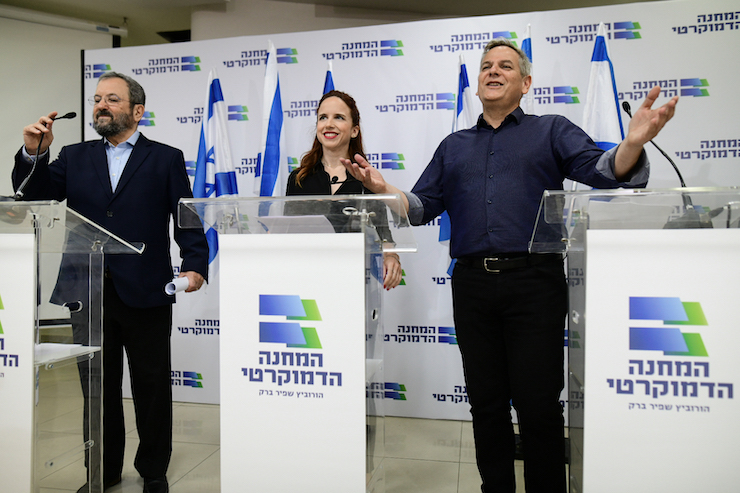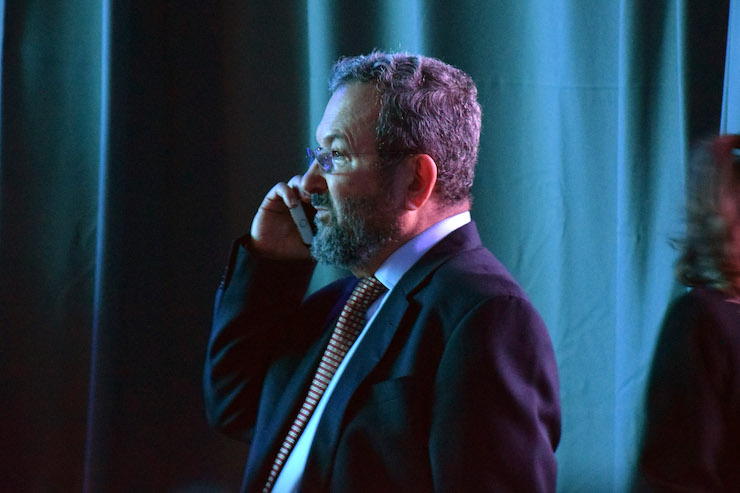As Israel’s center-left and centrist parties have dropped the topic of the occupation over the years, Meretz has remained the sole Jewish party to emphasize ending the Israeli-Palestinian conflict. But can it continue to hold out amidst running mate Ehud Barak’s talk of annexation?
By Meron Rapoport

Meretz has seen its fair share of criticism over the years — too white, too left-wing, too Zionist, too Tel Aviv-centric, too occupation-oriented, too elitist. But there is one thing you can’t take from it: Meretz’s party platform has always clearly called for an end to the occupation and the establishment of a Palestinian state alongside Israel, even as Israel’s centrist and center-left parties have done all they can to avoid dealing with the Israeli-Palestinian conflict.
Not a single other Jewish party has been as emphatic on this issue. Prior to the last Israeli elections in April, former Meretz Chairwoman Tamar Zandberg traveled to Ramallah to meet with Palestinian President Mahmoud Abbas. Meretz has also put an emphasis on Jewish-Arab partnership throughout the last few years, and has even considered turning the party into a joint Jewish-Arab one.
As such, recent statements by Ehud Barak — who is number 10 in the Democratic Union list of which Meretz is a part — should be considered a clear departure from the dovish party’s positions. Barak acknowledges that the Palestinian issue is the “elephant in the room,” an exceptional acknowledgement in today’s political discourse, but his proposals for dealing with this elephant do not necessarily include ending the occupation or establishing an independent Palestinian state alongside Israel.
The two-state solution, says Barak, should be used as a goal for negotiations with the Palestinian Authority (he doesn’t mention the PLO). But if the two sides remain unable to come to an agreement, Israel must unilaterally annex the settlement blocs, including the settlements of Ariel and Kedumim, located deep inside the West Bank. The Israeli army, he continues, must maintain control of the rest of the occupied territories until negotiations start up again. In short, Barak believes that the end of the occupation and a Palestinian state are not basic principles — they are options, and not necessarily the preferred ones.
It is true that Barak’s Israel Democratic Party is only one of the three parties that makes up the Democratic Union, alongside Meretz and the Stav Shaffir-led Green Movement. But in the Union’s election campaign, it is Barak who is charged with speaking about the conflict, while Union leader on behalf of Meretz, Nitzan Horowitz, talks about religion and state and Shaffir talks about climate issues. In a conversation with prominent journalist Amit Segal Thursday, Barak said that the “Democratic Union is to the right of the Labor party.” This should come as a surprise to Meretz, which has always presented itself as Israel’s “real left.”
And then there is Yair Golan, who joined Barak in forming the Israel Democratic Party and is number three on the Democratic Union List. While Golan does not shy away from using the word “apartheid” when talking about the dangers of perpetual rule over the occupied territories, his unilateral annexation plan is even more thorough than that of Barak, including Kiryat Arba near Hebron and the entirety of the Jordan Valley. Golan also said that he prefers a coalition with Avigdor Liberman over one with the Joint List, the latter of which was viewed by Meretz as a natural partner.
Has Meretz given up on the basic principles that have guided it for years? In an agreement over “ideological guidelines” signed by the three parties that make up the Democratic Union, the words “ending the occupation” or “two states” do not appear. In their place appears a vague version of “striving for peace and a negotiated settlement.” In the Labor Party platform, both under Avi Gabbay and under his successor, Amir Peretz — who has been vilified for allegedly abandoning the conflict — the term “two states” is explicitly mentioned.
It’s difficult to say whether this change has led to infighting inside Meretz, but party leaders say the decision has certainly been a difficult one. There are those who claim that the gap between Barak’s positions and the classic Meretz platform are not that extreme, and that the two sides agree on “95 percent.” Others say the gaps are large and worry that the right could take advantage of the fact that even Meretz now appears to be talking about annexation. Yet nearly everyone in the party takes solace in the fact that Barak is actually talking about the conflict.
Beyond that, a joint campaign with Barak means Meretz won’t have to worry about not passing the electoral threshold for the first time in many years. Meretz leaders say that after the elections on Sept. 17, Barak will disappear from party life, since he won’t make it into the next Knesset.
Former MK Mossi Raz, who is widely seen as the head of the “anti-occupation” camp in Meretz, is happy with the partnership with Barak, which he says has “strengthened the discourse on the occupation.”

“I am against unilateral annexation, either with or without American backing,” says Raz. He does not hide his differences with Barak on this issue or on Barak’s infamous declaration that there is “no partner for peace” on the Palestinian side. Yet he prefers that a person like Barak, whose words as a former prime minister and IDF chief of staff carry significantly more weight, will say these things “rather than people with whom I agree with on everything, who prefer to remain silent, including one or two members of my own party.”
Raz is mostly likely referring to Horowitz, who refrains from expressing opinions on the Israeli-Palestinian conflict, especially since the establishment of the Democratic Union. That silence on the occupation as well as on the issue of Jewish-Arab partnership upsets many in Meretz.
Uri Zaki, the former president of Meretz’s Governing Assembly, agrees with Raz’s assessment of Barak. Yet the content of the former prime minister’s declarations is problematic in his view. These positions, says Zaki, “do not align with Meretz’s position, especially vis-à-vis unilateral annexation, and particularly when the Trump administration is able to back unilateral moves. The solution is between Ramallah and Jerusalem. There is a partner on the Palestinian side, even if it is weak.”
If there is something that worries almost everyone in Meretz, it is what will happen on the day after the election, and what role Meretz will play as a faction in the Democratic Union. Of the first 11 candidates, only four belong to the party. In the meantime, the only person talking about political solutions to the Israeli-Palestinian conflict is Barak.
To date, the Israeli “peace camp” has never truly recovered from Barak’s “no partner” declarations. According to his interview with Segal on Thursday, he doesn’t really seem to regret that fact. In 2000, Barak brought down the Labor Party, both ideologically and in terms of voters. Now, the question is whether he will do the same to Meretz.
Meron Rapoport is an editor at Local Call, where this article first appeared in Hebrew. Read it here.


